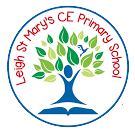English - Reading
Intent, Implementation and Impact
English Reading Intent Statement
At Leigh St Mary’s we instil the importance of reading in pupils and our families from the earliest opportunity; starting during the transition program into our reception class. We want children to foster a love of reading that will lead to them being lifelong readers and learners. At Leigh St. Mary’s, we place equal importance on decoding skills and comprehension alongside excellent communication skills which will equip pupils for success at primary school and beyond.
We understand that there are essential characteristics that readers demonstrate. The intent of the English reading and phonics curriculum from Early Years to Year 6 is to build these characteristics within our pupils.
The essential characteristics of readers are:
- Excellent phonic knowledge and skills.
- Fluency and accuracy in reading across a wide range of contexts throughout the curriculum.
- Knowledge of an extensive and rich vocabulary.
- An excellent comprehension of texts.
- The motivation to read for both study and pleasure.
- Extensive knowledge through having read a rich and varied range of texts.
(The Essentials Curriculum, Chris Quigley Education)
English Reading Curriculum Implementation
At Leigh St Mary’s our DfE approved systematic synthetic phonics programme is Sounds Write. From reception to Year 6, pupils learn the concepts necessary for proficient reading and writing. They are introduced to the 175 most common spellings of the 44 sounds in English through a carefully crafted sequence that goes from simple to more complex. They learn and practise the Initial Code to mastery before starting on the Extended Code, and, soon after, the reading and writing of polysyllabic words. Based on the latest research into cognitive load theory and the principles of direct instruction, the programme has been specially designed to accelerate learning – no matter what the pupil’s starting point or level.
(Sounds Write. A new approach to the teaching of reading, spelling and writing)
Alongside Sounds Write, we teach reading comprehension through exposure to high quality books and via discrete guided reading lessons. We also acknowledge that parents and carers are our pupils’ first educators and we send high quality decodable texts and reading books home to embed learning. Our readers learn through stages: early reader, developing reader and fluent reader. At early reader and developing reader stages, phonics texts are precisely matched to the sound(s) being taught in class. Once children become fluent decoders, they read texts that challenge and further their reading skills and knowledge.
Discrete guided reading lessons are taught using the principles of the SHINE Are You Really Reading? project. Leigh St. Mary’s engaged with this in September 2023 as the reading initiative started its third year. The project consists of a teaching tool to equip pupils to really read for meaning using five strands to explicitly teach comprehension strategies.
Developing and nurturing a love of reading is of critical importance to Leigh St. Mary’s. From singing, reciting nursery rhymes and poetry to story time and reading for the pure joy of it, pupils are offered a wealth of books and reading opportunities in school.
The word reading and reading comprehension progression of skills map is designed with these two elements:
- Word reading: Sounds Write decoding, fluency and common exception words
- Reading comprehension: understanding the text, communicate meaningfully about the text, inference and prediction skills, poetry and performance and non-fiction genres.
The word reading and reading comprehension progression of skills map at Leigh St Mary’s is sequential, allowing children to build their skills and knowledge, and to develop ownership and autonomy over time. A large range of book genres are provided to pupils via the school’s core book spine (‘Books to Inspire’ document), ‘protected’ class story/novel times and inviting and carefully crafted book corners. This immersion in books increases pupil knowledge, vocabulary and exposes them to excellent author models.
The word reading and reading comprehension progression of skills map shows the skills taught within each year group and how these skills develop to ensure that attainment targets are securely met by the end of each key stage. The skills and complexities of reading are robustly embedded in daily discrete reading lessons and high quality books complement cross-curricular subjects. We aim to embed a feeling of success and a sense of really reading from the earliest stage. Reading is high profile across school with vibrant book areas around school, carefully chosen invitations to read displayed and book recommendations encouraged in class and given regularly to pupils and families via the school’s social media platforms.
English Reading Curriculum Impact
Through methodical teaching and monitoring of Sounds Write, pupils develop their phonics skills and knowledge. Comprehension skills progress from the earliest stage through the promotion of language skills and vocabulary, a rich diet of high-quality texts to read for pleasure both in school and at home and through targeted, discrete guided reading sessions. The combination of decoding and comprehension skills provides support for pupils to become fluent readers with positive reading habits embedded for life.
Assessment
- Phonic knowledge is assessed in our earliest readers on an ongoing basis during Sounds Write and discrete individual and group reading sessions. Sounds Write knowledge is assessed formally termly in reception and Year 1.
- The statutory Phonics Screening Check takes place in Year 1.
- Reading skills are assessed on an ongoing basis in all year groups during discrete guided reading sessions and through reading individually to an adult in school.
- Reading skills are assessed formally each term using NFER and previous year SATs assessments in Y2 and Y6.
- Statutory end of key stage SATs reading paper take place in Year 6.
- Reading is monitored regularly by the English Subject Lead and Early Years HLTA.
